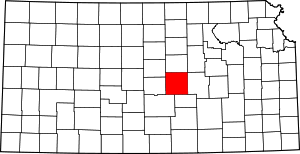Lindsborg, Kansas
Lindsborg is a city in McPherson County, Kansas, United States.[1] As of the 2010 census, the city population was 3,458.[7] Lindsborg is known for its association with Swedish heritage and the biennial Svensk Hyllningsfest.
Lindsborg, Kansas | |
|---|---|
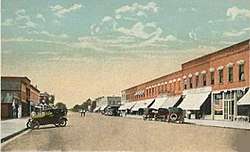 Lindsborg in the early 20th century | |
| Nickname(s): Little Sweden | |
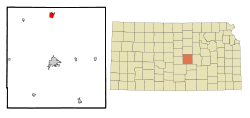 Location within McPherson County and Kansas | |
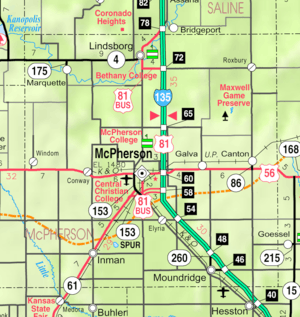 KDOT map of McPherson County (legend) | |
| Coordinates: 38°34′25″N 97°40′28″W[1] | |
| Country | United States |
| State | Kansas |
| County | McPherson |
| Founded | 1869 |
| Incorporated | 1879 |
| Named for | Linden Castle |
| Area | |
| • Total | 1.85 sq mi (4.78 km2) |
| • Land | 1.83 sq mi (4.74 km2) |
| • Water | 0.02 sq mi (0.04 km2) |
| Elevation | 1,332 ft (406 m) |
| Population | |
| • Total | 3,458 |
| • Estimate (2019)[4] | 3,290 |
| • Density | 1,797.81/sq mi (694.02/km2) |
| Time zone | UTC-6 (CST) |
| • Summer (DST) | UTC-5 (CDT) |
| ZIP code | 67456 |
| Area code | 785 |
| FIPS code | 20-41375 [1][5] |
| GNIS ID | 0477070 [1][6] |
| Website | lindsborgcity.org |
History
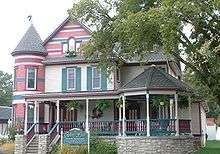
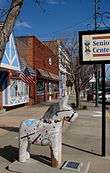
For many millennia, the Great Plains of North America were inhabited by nomadic Native Americans. From the 16th century to 18th century, the Kingdom of France claimed ownership of large parts of North America. In 1762, after the French and Indian War, France secretly ceded New France to Spain, per the Treaty of Fontainebleau.
In 1802, Spain returned most of the land to France. In 1803, most of the land for modern day Kansas was acquired by the United States from France as part of the 828,000 square mile Louisiana Purchase for 2.83 cents per acre.
In 1854, the Kansas Territory was organized, then in 1861 Kansas became the 34th U.S. state. In 1867, McPherson County was established within the Kansas Territory, which included the land for modern day Lindsborg.
Lindsborg was settled in the spring of 1869 by a group of Swedish immigrants from the Värmland province of Sweden led by Pastor Olof Olsson.[8] Today, thirty percent of the population is of Swedish heritage. The downtown features gift shops that specialize in Swedish souvenirs, including various sizes of Dala horses. Lindsborg is known as "Little Sweden" because it was originally built up chiefly by Swedish immigrants in the late 19th century.
The city's Swedish-language name means Linden Castle in English.[9] It was named for three men (whose typical names included that tree's name), Messrs. Lind, Lindgren and Lindahl, who had held prominent positions in a Chicago organization of Swedish farmers (Svenska Lantbrukskompaniet) which was involved in the settling of Lindsborg until 1877.[10]
The first railroad was built through Lindsborg in 1879, and it was incorporated as a city in that same year.[11]
Lindsborg has long been noted for the Svensk Hyllningsfest and other efforts to remember its Swedish pioneer heritage. Svensk Hyllningsfest is a biennial celebration held in October of odd-numbered years since 1941, to celebrate the town's Swedish heritage.[12]
The Swedish Pavilion was originally built as an international exposition building for the 1904 St. Louis World's Fair. After the fair, the Swedish Pavilion was purchased by W.W. Thomas, U.S. Minister to Sweden and Norway, and presented to Bethany College in Lindsborg as a memorial to his friend Dr. Rev. Carl Aaron Swensson, the founder of Bethany College who had recently died. The Pavilion was moved to Bethany College in Lindsborg, where it was used for classroom, library, museum and department facilities for the art department. The Swedish Pavilion was moved to the McPherson County Old Mill Museum, also in Lindsborg in 1969.[13]
Lindsborg also has an art museum showcasing the works of the artist and later resident, Birger Sandzen. The Gallery was dedicated on October 20, 1957 on the Bethany College campus. It houses the largest and most extensive collection of his paintings, prints, drawings and watercolors found anywhere in the world.[14]
Swedish King Carl XVI Gustaf visited Lindsborg in April 1976 during his royal tour of the United States.[15]
Geography
Lindsborg is located at 38°34′25″N 97°40′28″W (38.5736176, -97.6744838).[1] According to the United States Census Bureau, the city has a total area of 1.69 square miles (4.38 km2), of which 1.67 square miles (4.33 km2) is land and 0.02 square miles (0.05 km2) is water.[16]
Climate
The climate in this area is characterized by hot, humid summers and generally mild to cool winters. According to the Köppen Climate Classification system, Lindsborg has a humid subtropical climate, abbreviated "Cfa" on climate maps.[17]
Area events
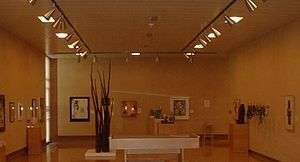
- Svensk Hyllningsfest is a biennial tribute to the Swedish pioneers occurring in October of odd numbered years.
Area attractions
Demographics
| Historical population | |||
|---|---|---|---|
| Census | Pop. | %± | |
| 1880 | 466 | — | |
| 1890 | 968 | 107.7% | |
| 1900 | 1,279 | 32.1% | |
| 1910 | 1,939 | 51.6% | |
| 1920 | 1,897 | −2.2% | |
| 1930 | 2,016 | 6.3% | |
| 1940 | 1,913 | −5.1% | |
| 1950 | 2,383 | 24.6% | |
| 1960 | 2,609 | 9.5% | |
| 1970 | 2,764 | 5.9% | |
| 1980 | 3,155 | 14.1% | |
| 1990 | 3,076 | −2.5% | |
| 2000 | 3,321 | 8.0% | |
| 2010 | 3,458 | 4.1% | |
| Est. 2019 | 3,290 | [4] | −4.9% |
| U.S. Decennial Census | |||
2010 census
As of the census[3] of 2010, there were 3,458 people, 1,303 households, and 829 families residing in the city. The population density was 2,070.7 inhabitants per square mile (799.5/km2). There were 1,414 housing units at an average density of 846.7 per square mile (326.9/km2). The racial makeup of the city was 94.8% White, 1.7% African American, 0.1% Native American, 0.5% Asian, 0.1% Pacific Islander, 0.8% from other races, and 2.1% from two or more races. Hispanic or Latino of any race were 3.5% of the population.
There were 1,303 households of which 28.1% had children under the age of 18 living with them, 52.3% were married couples living together, 8.4% had a female householder with no husband present, 2.9% had a male householder with no wife present, and 36.4% were non-families. 31.1% of all households were made up of individuals and 15.7% had someone living alone who was 65 years of age or older. The average household size was 2.31 and the average family size was 2.88.
The median age in the city was 37.8 years. 20.3% of residents were under the age of 18; 17.4% were between the ages of 18 and 24; 18.7% were from 25 to 44; 23.6% were from 45 to 64; and 19.9% were 65 years of age or older. The gender makeup of the city was 47.5% male and 52.5% female.
2000 census
As of the census[5] of 2000, there were 3,321 people, 1,227 households, and 775 families residing in the city. The population density was 2,155.5 people per square mile (832.6/km2). There were 1,331 housing units at an average density of 863.9 per square mile (333.7/km2). The racial makeup of the city was 97.05% White, 1.11% African American, 0.39% Native American, 0.30% Asian, 0.30% from other races, and 0.84% from two or more races. Hispanic or Latino of any race were 1.60% of the population. 36.0% were of Swedish, 22.3% German, 8.4% American, 6.4% English and 5.7% Irish ancestry according to Census 2000.[18][19]
There were 1,227 households out of which 29.3% had children under the age of 18 living with them, 53.3% were married couples living together, 7.8% had a female householder with no husband present, and 36.8% were non-families. 33.8% of all households were made up of individuals and 17.7% had someone living alone who was 65 years of age or older. The average household size was 2.26 and the average family size was 2.89.
In the city, the population was spread out with 20.5% under the age of 18, 18.7% from 18 to 24, 21.0% from 25 to 44, 19.0% from 45 to 64, and 20.7% who were 65 years of age or older. The median age was 37 years. For every 100 females, there were 94.3 males. For every 100 females age 18 and over, there were 89.0 males.
The median income for a household in the city was $37,500, and the median income for a family was $46,250. Males had a median income of $32,500 versus $25,145 for females. The per capita income for the city was $17,415. About 4.9% of families and 8.2% of the population were below the poverty line, including 7.0% of those under age 18 and 9.7% of those age 65 or over.
Education
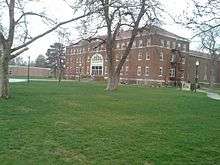
Primary and secondary education
The community is served by Smoky Valley USD 400 public school district.[20][21] Lindsborg is the home of:
- Smoky Valley High School
- Smoky Valley Middle School
- Soderstrom Elementary
College
Other
- Lindsborg is also home to the Anatoly Karpov International School of Chess, located downtown.[22]
Transportation
K-4 highway passes through Lindsborg. Bus service is provided daily towards Wichita and Salina by BeeLine Express (subcontractor of Greyhound Lines).[23][24]
Notable people
- Jay Emler, Kansas Senate majority leader since 2011, District 35 senator since 2001, was previously a Lindsborg municipal judge[25]
- Ted Kessinger, retired college football coach, member College Football Hall of Fame[26]
- Emory Lindquist, 1930 Rhodes Scholar, Swedish-American historian, President of Bethany, President of Wichita State University
- Ebba Nylander, violinist and conductor born in Lindsborg
- John W. Peterson, Gospel songwriter born in Lindsborg
- Birger Sandzén, Swedish-born painter and teacher
Gallery
- Historic Images of Lindsborg, Special Photo Collections at Wichita State University Library
- Photo from 1961 Svensk Hyllnings Fest
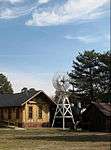 Old Lindsborg Railroad Station, 2007
Old Lindsborg Railroad Station, 2007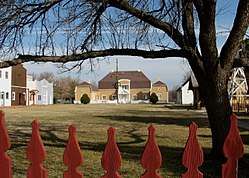 Swedish Pavilion from 1904 Saint Louis World's Fair, 2009
Swedish Pavilion from 1904 Saint Louis World's Fair, 2009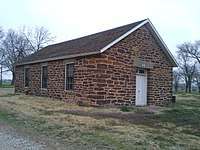 Fremont Lutheran Church near Lindsborg
Fremont Lutheran Church near Lindsborg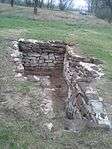 Höglund Dugout, a former sod house, on 12th Avenue off Wells Fargo Road one mile from Lindsborg
Höglund Dugout, a former sod house, on 12th Avenue off Wells Fargo Road one mile from Lindsborg
See also
- National Register of Historic Places listings in McPherson County, Kansas
- Berquist & Nelson Drugstore Building (1880)
- Clareen-Peterson Restaurant Building (1899)
- Farmers State Bank (1887)
- Holmberg and Johnson Blacksmith Shop (1900)
- Johnson House (1887)
- Smoky Valley Roller Mill (1898)
- Swedish Pavilion (1904)
- Teichgraeber-Runbeck House (1906)
- Lindsborg United States Post Office (1938)
- National Register of Historic Places listings in Saline County, Kansas
- Coronado Heights (1936)
References
- Geographic Names Information System (GNIS) details for Lindsborg, Kansas; United States Geological Survey (USGS); October 13, 1978.
- "2019 U.S. Gazetteer Files". United States Census Bureau. Retrieved July 24, 2020.
- "U.S. Census website". United States Census Bureau. Retrieved 2012-07-06.
- "Population and Housing Unit Estimates". United States Census Bureau. May 24, 2020. Retrieved May 27, 2020.
- "U.S. Census website". United States Census Bureau. Retrieved 2008-01-31.
- "US Board on Geographic Names". United States Geological Survey. 2007-10-25. Retrieved 2008-01-31.
- "2010 City Population and Housing Occupancy Status". U.S. Census Bureau. Retrieved March 6, 2011.
- Little Sweden on the Prairie (The Local Europe AB)
- Engelsk-svenska ordboken ISBN 91-24-34422-2 pp 211 & 44
- Prins Wilhelm in Amerika från estraden, Norstedts, Stockholm, 1928, pp 183 & 195 (re: origin of name and farmers' organization)
- Blackmar, Frank Wilson (1912). Kansas: A Cyclopedia of State History, Volume 2. Standard Publishing Company. pp. 165.
- The Origins of the Festival (Svensk Hyllningsfest)
- Carl Aaron Swensson Archived 2012-06-26 at the Wayback Machine
- "Its History (Birger Sandzén Memorial Gallery)". Archived from the original on 2011-05-14. Retrieved 2010-09-22.
- "Cold-ridden king gets warm welcome". The Salina Journal. Salina, Kansas. April 18, 1976. p. 1. Retrieved October 7, 2017 – via Newspapers.com.
- "US Gazetteer files 2010". United States Census Bureau. Archived from the original on 2012-07-02. Retrieved 2012-07-06.
- Climate Summary for Lindsborg, Kansas
- U.S. Census Bureau - 2000 Census, Population and Housing Unit Counts for Kansas
- U.S. Census Bureau - 1990 Census, Population and Housing Unit Counts for Kansas
- USD 400
- Kansas School District Boundary Map Archived 2011-07-21 at the Wayback Machine
- May 2006 National Geographic Magazine
- BeeLine Express
- "Greyhound Lines". Archived from the original on 2019-09-06. Retrieved 2016-01-03.
- "Biography for Jay Emler – Kansas Senate majority leader". Retrieved 2013-03-04.
- "College Football". ESPN. May 11, 2010.
Further reading
- The Americanization of a Swedish Colony in Kansas; Julius Lundstrom; 1972.
- Northern McPherson County Centennial Observance; Marie E. Malm; Lindsborg News-Record, 1970.
- The Smoky Valley in the After Years; Ruth B. Billdt; Lindsborg News-Record, 1969.
- Smoky Valley People: A History of Lindsborg, Kansas; Emory K. Lindquist, 1953.
- Swedish Day in Lindsborg; Mrs. Carl Peterson; Enterprise Journal; May 26, 1938.
- Lindsborg, Kansas: Fragments of History by the City Schools; Lindsborg City Schools; 1927.
External links
| Wikivoyage has a travel guide for Lindsborg (Kansas). |
| Wikimedia Commons has media related to Lindsborg, Kansas. |
- City
- Lindsborg - Official
- Lindsborg - Directory of Public Officials, League of Kansas Municipalities
- Lindsborg Convention & Visitors Bureau
- Historical
- McPherson County Old Mill Museum
- Birger Sandzén Gallery
- Karmon Almquist - Lighting The Way in Little Sweden on YouTube, from Hatteberg's People on KAKE TV news
- Michaela Valli Groeblacher - A Sculptor Who Believes in Wrinkles on YouTube, from Hatteberg's People on KAKE TV news
- Jim Richardson - Photojournalist for National Geographic Magazine on YouTube, from Hatteberg's People on KAKE TV news
- Maps
- Lindsborg City Map, KDOT
